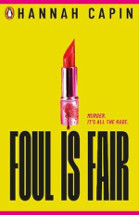Foul is fair by Hannah Capin

Penguin, 2020. ISBN: 9780241404973.
(Age: 16+) Highly recommended. Revenge - this is the name of the jet
black hair dye that Elle chooses for her transformation into Jade,
following the night of her sweet 16 birthday outing to the St
Andrew's prep party, a party which changed her life, where she,
bright, shimmering in her silver dress and full of party fun, found
herself drugged by a spiked drink and gang raped by the school's
best young lads. Author Capin spares us the details of that night,
but the brief memory flashes that haunt Elle/Jade let us know enough
of what happened.
Elle decides she is not a victim, she is not a survivor, she is an
Avenger. She and her coven of loyal friends, Jenny, Summer and Mads,
set out to exact that vengeance with the death of every boy that
took part. And so Elle cuts and dyes her hair, and becomes Jade, the
tough new girl at St Andrew's. These are the first couple of
chapters of Capin's book. From there the action grips you by the
throat and drags you into the spiral of events where Jade, cool and
ruthlessly in control, targets each of her assailants one by one. A
pawn in Jade's game is the honourable young Mack, a boy who was not
part of the gang, but who becomes an easy target, someone who will
do her bidding.
If you think the story sounds violent and gruesome, think about the
plot of Macbeth, the Shakespearean play offered to senior
secondary students. Capin's novel is another version of the Macbeth
story; only it is not a mother driving her son to murder, but an
equally driven girl able to manipulate Mack in just the same way.
Her three friends are her coven, the witches, who chant and foretell
the future and assist Jade in becoming the powerful queen of the St
Andrew's peer group. There is no mercy, no kindness, no love, just a
fierce determination for vengeance and power.
Capin's novel would make an interesting study in its
reinterpretation of Shakespeare's play, an adaptation for modern
times that is bound to capture the imagination of students with its
setting of school peer groups, jealousy, bullying, and sexual
assault.
Helen Eddy